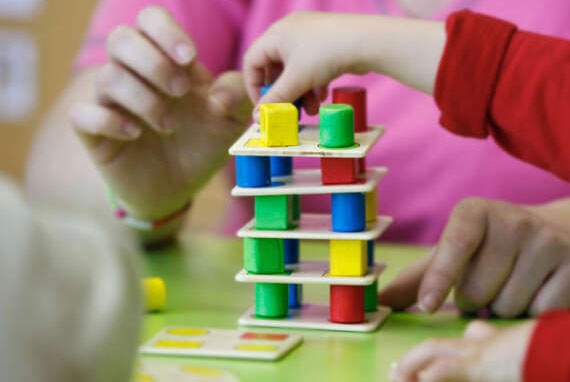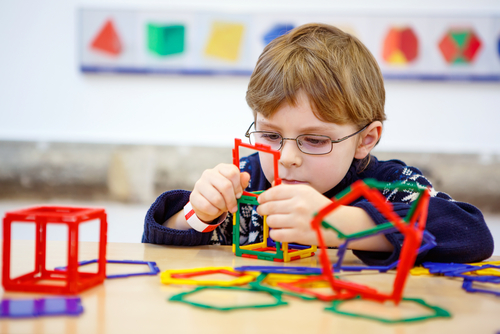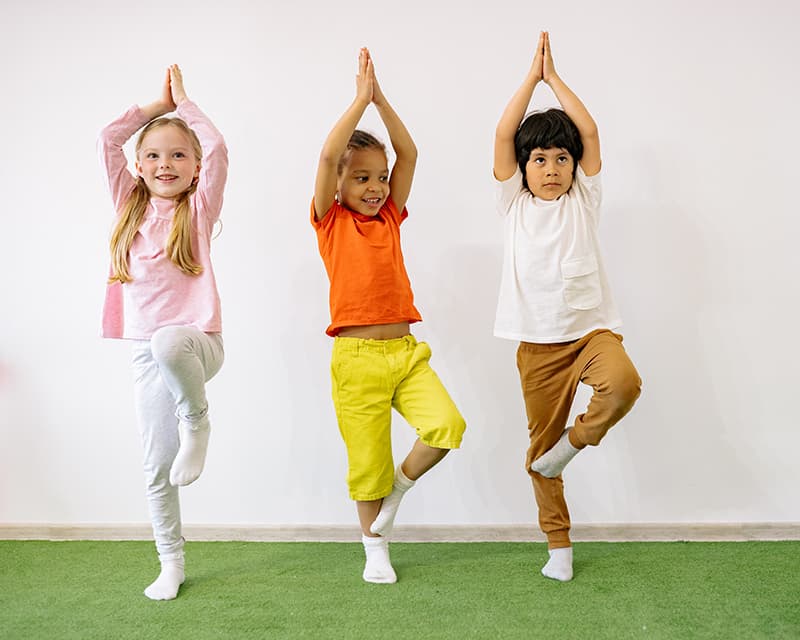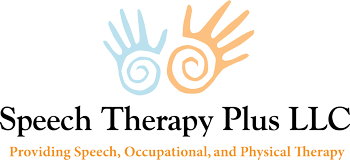Pediatric Occupational Therapy
We provide Pediatric Occupational Therapy services for infants and children through young adulthood. Our goal is to facilitate the development of functional skills in a fun and playful environment. We build on the strengths of each child while addressing the areas that need enhancement. This enables children to produce appropriate motor and behavioral responses in order to complete everyday routines including sleeping, eating, playing, bathing, dressing, and participating in family activities at home and in the community. Using a variety of therapeutic approaches, our skilled therapists work individually with each child and their families to develop a unique plan of care that will address a child’s ability to improve function in any of the following areas:
FINE AND GROSS MOTOR SKILLS
Fine motor skills are small movements such as holding a fork or spoon and picking up small objects. Utilizing the small muscles of the fingers, toes, wrists, lips, and tongue. Gross motor skills are the larger movements for example rolling over and sitting up. Utilizing the large muscles in the arms, legs, torso, and feet.
Your fine motor movements require a high degree of control and precision. These may include drawing or coloring, writing, using scissors to cut paper, and eating with utensils. Gross motor refers to movements that are generally more broad and energetic than fine motor movements. These may include walking, running, climbing and jumping. Both fine and gross motor skills involve hand and eye coordination.

SENSORY INTEGRATION AND PROCESSING
Sensory integration therapy aims to help with sensory processing issues (often referred to as “sensory integration disorder”). This is done by sensory stimulation in a structured, repetitive way. Many Occupational Therapists use this type of therapy as part of a more extensive “sensory diet” treatment. This therapy can include carefully designed balance treatments, movement therapy and structured exposure to sensory input.
COORDINATION AND BALANCE
Is your child experiencing delays in skills needed to complete their daily activities, such as balance or coordination? Some signs are frequently falling or tripping over objects at home. They may also be slower to crawl or walk than an average child’s milestones. A pediatric occupational therapist can help your child with these challenges. Therapy sessions may occur in a range of different settings, including a therapeutic preschool program, typical classroom, hospital, or private practice clinic. Some therapy sessions can include: yoga, following a straight line taped to the floor, or using a pool noodle to balance on the floor, and hopscotch is a fun way to practice balance.
SELF-CARE AND REGULATION OF BEHAVIOR
Self-regulation is the ability for your child to manage their emotions and behavior depending on the situation. Control of highly emotional reactions to upsetting events, to calm themselves down when they get upset. Handle frustration without an outburst. It is a set of skills that enables children, as they mature, to direct their own behavior towards a goal, despite the unpredictability of the world and their own feelings. Children learn to care for themselves by managing their emotions in a positive way for their well-being. An Occupational Therapist can assist a child in determining what upsets them and how to effectively understand thier emotions.
VISUAL PERCEPTUAL SKILLS
This refers to the brain’s ability to make sense of what the eyes see. This is not the same as say 20/20 vision. A child can have 20/20 vision but still have problems with processing visual perceptual. Some signs that your child might be having problems are: reversing numbers or letters when writing, completing puzzles, remembering left and right, matching socks and shoes when dressing, telling the difference of size of letters and objects, organizational skills, or finding an item on a cluttered table. An Occupational Therapist can help identify and assist the child to progress their ability of visual perception.

VISUAL MOTOR INTEGRATION
This involves communication between the eyes and the hands, so that you are able to draw or write what you see. It is the brain, not the eyes, that interprets what your child is trying to do. Children that struggle to integrate or coordinate their visual and motor systems may struggle with handwriting and other school projects. Children that have poor eye-hand coordination may struggle to start and stop the pencil in the space given, or overshoot the lines. If your child has a Visual Motor Integration problem, school, athletics, and even social interaction can be challenging. One-on-one vision training can effectively improve their skills.
FEEDING
Feeding therapy helps children learn how to eat or how to eat better. Occupational Therapists provide feeding therapy, this is a specialty within their specialty. If you have a picky eater it could be helpful to seek additional advice about feeding from our feeding specialist. Generally speaking, feeding therapy is helpful if your child is having difficulty eating. Age doesn’t matter. For example, if you are concerned about your child chewing correctly, or if they cough every time after drinking. Getting an evaluation could put your mind at ease.
HANDWRITING REMEDIATION
It is a skill that is required for full participation in school activities. Thus, difficulties will have an impact on a child’s success in school and self-esteem. Children that have difficulty mastering the skill of writing are most common among children with various disorders, such as ADHD, learning disabilities (LDs), and speech and language difficulties. Typically, handwriting development begins between the ages of three and four, appearing as scribbles and wiggly lines. By four and five the letters begin to take on a more legible shape. Frequent daily lessons, guided practice, instruction, and practice will aid in the development of handwriting.
PLAY PARTICIPATION
An important part of a child’s life is play. It allows them to grow and learn. Through play children make a sense of their environment and develop physical coordination, emotional maturity, and social skills. Thus gaining self-confidence. A therapist can determine what toys will be safe, developmentally appropriate, and fun for a particular child from their evaluation of their neurological, muscular and emotional development. They can offer play opportunities that encourage taking turns and solving problems. This includes children with or without disabilities. If you feel your child is not participating in play, you can have your child evaluated and establish a program that will help with their development.
YOGA FOR KIDS
Speech Therapy Plus LLC is offering Radiant Child Yoga for ages 4 and up. Radiant Child Yoga will help children of all abilities to:
- Develop body awareness
- Manage stress through breathing meditation and healthy movement
- Improve flexibility in joints and improve balance
- Increased proprioception
- Strengthen respiratory muscles
- Helps develop motor planning skills
- Improves low muscle tone

Speech Therapy Plus LLC accepts most insurances.
View Julia Chernova on Linkedin.
